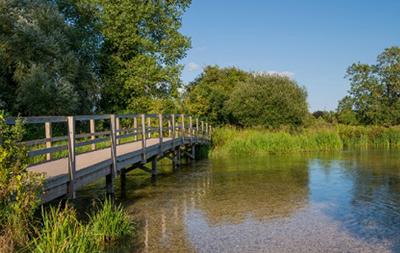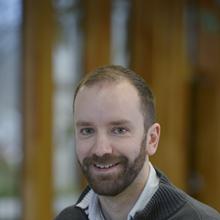Celebrating 10 years of Research with Impact at The Vitacress Conservation Trust

A team from the University of Southampton attended the tenth anniversary Vitacress Conservation Trust (VCT) Annual Forum on 25 November 2016, hosted by Sparsholt Agricultural College, Winchester, to celebrate the successes of the past 10 years of Action Research and to share latest research findings.
The Forum brings together a diverse range of stakeholders including NGO representatives, riparian landowners, the statutory authorities (Environment Agency, Natural England), local Government, watercress producers, scientists and farmers – all of whom share an interest in conserving Hampshire chalk streams.
The Trust’s founding Patron, the Earl of Selborne, GBE, FRS, DL, was invited to chair the day and was introduced by the current Patron, Lady Wakeham. Professor Gail Taylor from Biological Sciences, University of Southampton and Chair of the VCT, presented an overview of the successes of the Trust to date, including a number of high profile ‘Annual Environment Lectures’ with speakers such as Government Chief Scientist Professor Sir John Beddington, TV conservation scientist and Southampton Alumnus Chris Packham and Lord Deben, current Chair of the Committee on Climate Change. The VCT has also funded four PhD studentships, that have provided compelling evidence to inform policy on phosphorous in chalk streams and the impact of watercress chemicals on river shrimps. Over the course of ten years, 55 presentations have been made to the Forum on topics ranging from water quality and quantity, fish life, bioengineering of rivers, and the septic tank map of the UK. Two separate specialist groups emerged from the first Forum – the Bourne Rivulet Initiative (BRI) and the Upper Itchen Initiative (UII) that the Trust supports through regular meetings of all interested stakeholders, to enable ongoing discussion and actions to be prioritised for the benefit of the streams.
However, there was also an eye on the future with talks highlighting how increasing demand for water with 130,000 planned new houses in Hampshire, the impacts of climate change, and the effects of pollution, all put pressure on these important ecosystems. The wider context of departure from the EU and consequences for environmental legislation in a post- CAP (Common Agricultural Policy) world also provided lively topics for debate and suggested that the Trust will remained central to the delivery of healthy streams in a future, unpredictable world.
The University of Southampton, funded by VCT, is leading a timely project to measure the ecosystem services provided by the chalk streams and to evaluate the trade-offs between them. This research, undertaken by PhD student Jennifer Ball and supervised by Drs Kelvin Peh, Jake Snaddon and Robert Holland will give decision makers the evidence to ensure more effective assessments about how to manage the streams sustainably, for the good of both society and nature. As a result of the Forum, The Environmental Agency will now take a closer role in the project, thus ensuring Impact from the research is delivered to policy makers in a timely manner.
Lord Selborne closed the day by acknowledging that the Trust, although acting on a small scale, was an exemplar for how stakeholders needed to work together to solve complex environmental problems. Building a dialogue between different interest groups over the last 10 years is the real triumph of the Trust. We hope this will continue for decades to come.




